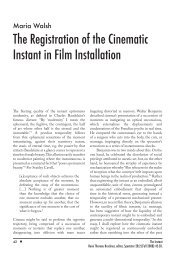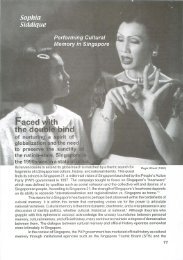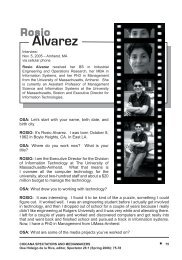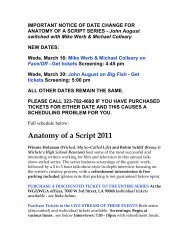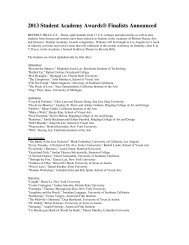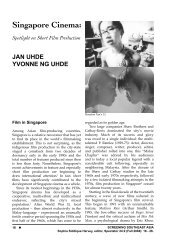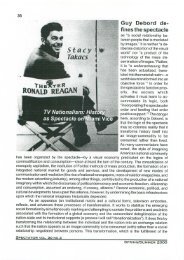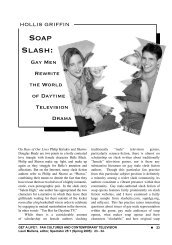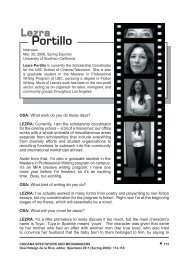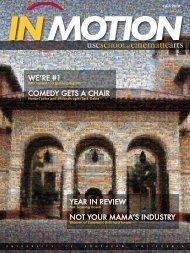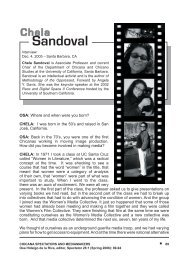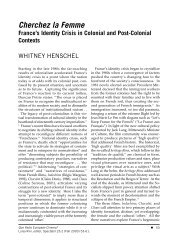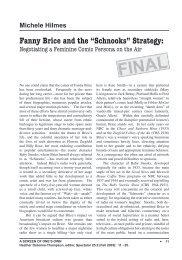IN MOTION (backup) V.3 - USC School of Cinematic Arts - University ...
IN MOTION (backup) V.3 - USC School of Cinematic Arts - University ...
IN MOTION (backup) V.3 - USC School of Cinematic Arts - University ...
Create successful ePaper yourself
Turn your PDF publications into a flip-book with our unique Google optimized e-Paper software.
“<br />
Advanced Editing Students “Eye” New Opportunities<br />
Production students at the <strong>USC</strong> <strong>School</strong> <strong>of</strong><br />
Cinema-Television shoot and edit short films <strong>of</strong><br />
varying lengths and complexity, but no class has<br />
ever edited an entire feature-length film. That is, no class<br />
had ever done that until last spring, when 12 students in<br />
Norman Hollyn’s Advanced Editing Class (CTPR 556), reedited<br />
Aaron Woodley’s feature film Rhinoceros Eyes, starring<br />
Michael Pitt, Paige Turco, and Gale Harold. The film, winner<br />
<strong>of</strong> the 2003 Toronto Film Festival’s Discovery Program,<br />
was released in May by Madstone Films.<br />
The project was set in motion when two <strong>of</strong> the film’s producers,<br />
Tom Gruenberg and Chip Seelig, began supplying<br />
footage to schools for students to re-edit scenes.<br />
We [were] thrilled with our cut, but the nature <strong>of</strong> the story<br />
is such that there are many stories that could have been told<br />
from the source material,” said Gruenberg. “We thought<br />
that the project would be enlightening as well as help generate<br />
college/university-level discussions <strong>of</strong> the film.”<br />
The two contacted <strong>USC</strong> and, through Pr<strong>of</strong>essor Doe Mayer,<br />
were put in touch with Hollyn.<br />
In Memoriam<br />
(continued from page 14)<br />
dear friends <strong>of</strong> the <strong>School</strong>, establishing an endowed faculty<br />
chair in 1997 and providing funds for student support<br />
and other vital needs.<br />
Ray Stark is survived by his daughter Wendy and granddaughter<br />
Allison.<br />
T.C. WANG<br />
Legendary Hong Kong filmmaker T.C. Wang, who studied<br />
cinema at <strong>USC</strong> more than a half-century ago, passed<br />
away in April at the age <strong>of</strong> 93.<br />
Widely regarded as the patriarch <strong>of</strong> the Chinese movie<br />
industry, Wang was involved in the production <strong>of</strong> hundreds<br />
<strong>of</strong> film and television shows, including The World<br />
<strong>of</strong> Suzy Wong, The Deer Hunter, Rush Hour 2, Hawaii<br />
Five-0, Love Boat, and Shogun.<br />
Wang founded Salon Films, a worldwide leader in film<br />
production headquartered in Hong Kong, and also served<br />
as honorary chair <strong>of</strong> the Chinese Film Foundation.<br />
Wang’s children, including Fred, director <strong>of</strong> Salon Films,<br />
also studied at <strong>USC</strong>.<br />
In 2002, he established the T.C. Wang Internship<br />
Program at the <strong>USC</strong> <strong>School</strong> <strong>of</strong> Cinema-Television to<br />
provide more opportunities to film students committed<br />
to depicting Asian matters in film.<br />
Wang is survived by two sons and three daughters.<br />
“ We were in the process <strong>of</strong> taking a new look at the editing<br />
curriculum,” Hollyn said. “While we’re always interested in<br />
getting pr<strong>of</strong>essional footage for our students to learn editing<br />
techniques, it struck me that there was a larger opportunity<br />
here. Most <strong>of</strong> our graduate students go on to work in longer<br />
formats than they make here. But there is an appreciable<br />
difference in the editing process, between long and short<br />
films. In the re-editing process, it’s important to learn how<br />
changes in one area <strong>of</strong> the film can subtly impact the story<br />
45 minutes later. You also get a much different sense <strong>of</strong><br />
pacing when you’re working across 100 minutes, rather<br />
than 10.”<br />
Hollyn contacted Madstone and proposed that, instead <strong>of</strong><br />
supplying the raw footage from some selected scenes, they<br />
supply all dailies, as well as the original music that had been<br />
recorded by John Cale and Eric Woodley and all <strong>of</strong> the<br />
film’s paperwork. He and Madstone also agreed that the<br />
film’s director would come out to speak to the class to discuss<br />
his editing process.<br />
“ Aaron’s visit to the class was crucial for me since this wasn’t<br />
a class just about Rhinoceros Eyes, but about the entire editing<br />
process,” said Hollyn. “I crafted the class so there were<br />
constant visits from people involved in post-production. We<br />
had Walter Murch discuss editing Cold Mountain; composer<br />
Lee Curreri talked about how music interacts with editing;<br />
assistant editor Greg Thompson spoke about organizing<br />
editing rooms; and DVD producer Mark Rowen talked<br />
about the very new job category <strong>of</strong> creating DVDs. We also<br />
had <strong>USC</strong> alumnus Marcel Valcarce discuss Adobe After<br />
Effects, and DVD authoring maven Bruce Nazarian gave<br />
instructions about how to author a DVD. In addition,<br />
career consultant Janet Conn addressed the class on job<br />
hunting, networking, and résumé building.”<br />
Hollyn added that he is already working on finding new<br />
films to anchor the class in succeeding semesters (students<br />
will again work with Rhinoceros Eyes this fall). Seelig reported<br />
during his visit to the class that, <strong>of</strong> the dozen schools<br />
participating in the program, only <strong>USC</strong> was able to re-edit<br />
the entire film.<br />
“ There are some things that you’ve done,” director Woodley<br />
told the class, “that I wish I was able to put into our film.”<br />
Scenes from Rhinoceros Eyes. Actors pictured: Matt Servito,<br />
Victor Ertamanis, and Michael Pitt in frame 1; Pitt in frame<br />
2; Paige Turco and Pitt in frame 3; and Pitt and Ertamanis<br />
in frame 4.<br />
Ross/Time Warner Award<br />
(continued from page 1)<br />
dean’s chair at the <strong>USC</strong> <strong>School</strong> <strong>of</strong> Cinema-Television, the Steven J. Ross/Time Warner Award honors leaders who<br />
have advanced the modern media industry and culture. Honorees share Ross’ unwavering commitment to nurturing<br />
the talent and technology <strong>of</strong> the future. Past recipients include the late Ambassador Walter Annenberg, Kirk<br />
Douglas, Bill Cosby, and John Calley.<br />
This year’s award was presented to Daly by Richard D. Parsons, chairman and CEO <strong>of</strong> Time Warner Inc. Parsons<br />
spoke eloquently about the award’s legendary namesake and, in particular, about how Steven J. Ross brought fun<br />
and humanity to the workplace.<br />
“<br />
Steve really was a giant,” he noted. “He not only dreamt big, but he accomplished big things.”<br />
From left to right: Richard D. Parsons, chairman and CEO <strong>of</strong> Time Warner Inc., Steven J. Ross/Time Warner honoree<br />
Robert A. Daly, and Dean Elizabeth M. Daley.<br />
Like Ross, Daly’s management style — notably, his emphasis on friendship, teamwork, and individual integrity — set<br />
the standard for those who followed. “We at Time Warner are grateful for everything you did,” Parsons told Daly.<br />
During his years at Warner Bros., 13 <strong>of</strong> the more than 400 major motion picture releases overseen by Daly garnered<br />
Academy Award nominations for Best Picture, and three (Chariots <strong>of</strong> Fire, Driving Miss Daisy, and<br />
Unforgiven) received coveted Best Picture Oscars. Daly also had a guiding hand in bringing top-rated, top-quality<br />
programming (including such acclaimed series as China Beach, ER, Friends, and Murphy Brown) to television.<br />
Daly, a self-described “suit,” made a heartwarming acceptance speech, thanking his family and telling the gathering<br />
that “the most important person in my business life was Steve Ross … I owe him a lot.” Ross, said Daly,<br />
taught his colleagues that “it’s OK to bring your heart to work.”<br />
fall 2004 in motion | 15




